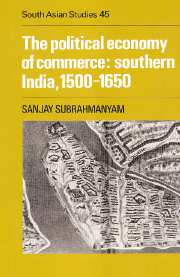Book contents
- Frontmatter
- Contents
- List of illustrations
- List of tables
- Preface
- Abbreviations used
- Introduction
- 1 The political economy of southern India, 1500–1650: preliminary remarks
- 2 Coastal trade and overland trade: complementarities and contradictions
- 3 Overseas trade, 1500–1570: traders, ports and networks
- 4 Overseas trade, 1570–1650: expansion and realignment
- 5 Europeans and Asians in an age of contained conflict
- 6 External commerce and political participation
- 7 Situating trade: models and methodological strategies
- Conclusion
- A note on currency and weights
- Glossary
- Note on sources
- Bibliography
- Index
- CAMBRIDGE SOUTH ASIAN STUDIES
6 - External commerce and political participation
Published online by Cambridge University Press: 13 January 2010
- Frontmatter
- Contents
- List of illustrations
- List of tables
- Preface
- Abbreviations used
- Introduction
- 1 The political economy of southern India, 1500–1650: preliminary remarks
- 2 Coastal trade and overland trade: complementarities and contradictions
- 3 Overseas trade, 1500–1570: traders, ports and networks
- 4 Overseas trade, 1570–1650: expansion and realignment
- 5 Europeans and Asians in an age of contained conflict
- 6 External commerce and political participation
- 7 Situating trade: models and methodological strategies
- Conclusion
- A note on currency and weights
- Glossary
- Note on sources
- Bibliography
- Index
- CAMBRIDGE SOUTH ASIAN STUDIES
Summary
Introduction
One of the major themes to be encountered in the historiography on pre-colonial trade in India is of the relationship between Asian traders, on the one hand, and the political structures of Asia, on the other. In part, this question has been addressed in the preceding chapter, for the delicate balance between Europeans and Asians, centering above all on the question of seapower, is intimately related to how Asian political structures viewed external trade. In the present chapter, however, the question of the interface between external commerce and political participation will be addressed far more directly, and it will be argued that there existed a set of persons whom we will term ‘portfolio capitalists’, occupying in the early seventeenth century the middle ground between the worlds of mercantile capitalism and political capitalism.
This view should be counterposed, properly speaking, to the dominant stream of thinking on this question. Numerous writers, including Michael Pearson, K.N. Chaudhuri, and most recently S. Arasaratnam, have addressed this issue for different parts of India in the sixteenth and seventeenth centuries. Pearson, whose argument was initially developed in the context of Gujarat, has since extended it to embrace much of the rest of India. He develops a picture of a society comprised of functionally defined cells in a beehive (closely identified by him with a somewhat rigid conception of caste), wherein one has a ‘militarily oriented elite’, whose ‘culturally sanctioned activities were land activities’, and were counterposed to the activities of ‘merchants’.
- Type
- Chapter
- Information
- The Political Economy of Commerce: Southern India 1500–1650 , pp. 298 - 342Publisher: Cambridge University PressPrint publication year: 1990
- 1
- Cited by



